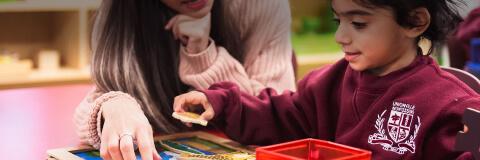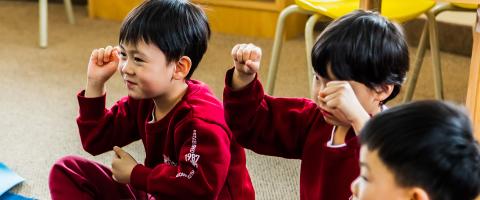CASA Programme
- Home
- Programmes
A Foundation Built On Excellence
At UC, the Montessori philosophy and method of teaching fosters a loving, independent environment tailored to the individual needs and development of each student.
The Montessori approach is a student-centred and student-directed teaching method, offered within a prepared environment, which fosters exploration, experimentation, creativity, and respect. Our Montessori Casa programme builds on the foundation of the Montessori Method with well-received enhancements and additional learning opportunities for our students in music, science, visual and dramatic arts, and more.
We are very proud of the strong reputation of our Casa programme which has, for many years, provided children with a strong foundation in academic and life skills all within family-like and supportive classroom environments.
When comparing UC with other schools, either public or private, parents may ask themselves what is the Montessori Casa programme difference?
-
Academic Excellence
Our structured, traditional Montessori approach helps students at an early age to develop solid foundations in language and mathematics compared to play-based kindergarten class.
-
Advanced Specialized Teaching
At UC, Casa students benefit from exposure to world-renowned teaching methods by our highly-trained Montessori teachers. In rotary, our teachers are specialized in their respective fields, giving them the ability to deliver our programme effectively. For instance in French, teachers make use of the AIMS gesture programme and in music, teachers use the Orff Approach.
-
Top of the Class Teaching Tools
Under the Montessori Casa Programme, classes have been enriched with the latest tools of instruction like iPads and robotics, enabling our children to learn with 21st century resources.
-
Parent Communication and Updates
Parents receive regular updates on their children’s development through individualized tracking sheets developed by our teachers.
-
Yearly Programme Innovation and Investments
UC takes great pride in continuously improving and taking advantage of the newest approaches to education. We are one of the very few schools that have a full-time research and development department that allows us to follow education innovations around the world.
Academics
Key Areas of learning in a UC Montessori Classroom include:
Practical Life exercises are exercises of daily living which assist children to refine motor skills while providing opportunities to take care of themselves and their environment. Students acquire grace, courtesy, and control of movement while learning to work independently, develop concentration, and prepare for later grades and specific subject areas.
Programme Enhancements
We have significantly enhanced the Montessori Casa Programme of education by offering additional opportunities for learning in such areas as French, music, visual arts, technology and computers, library, and physical education. Students participate in these enriching opportunities in small groups with same-aged peers. See the detailed information on our core programme below:
- Learn how to speak and listen
- Learn how to be an audience
- Learn how to introduce themselves
- Learn how to ask inquiry-based questions
- Learn how to make connections
- Learn how to anticipate and observe
- Learn how to practice critical reasoning skills
- Learn how to practice storytelling
- Learn how to distinguish between similarities and differences
- Learn how to use vocabulary
- Learn how to use descriptive language.



